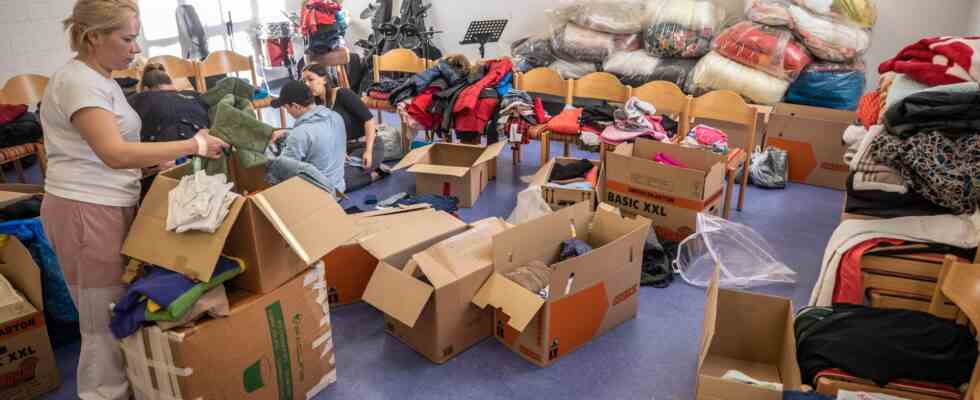Status: 02/13/2023 4:33 p.m
Hundreds of people have not been able to bring their relatives to Germany at short notice after the earthquake, and aid transports are delayed. There are bureaucratic hurdles not only in this country, but also in Turkey.
Mesut Hos wants to bring his parents to Germany as soon as possible. “The streets of my childhood no longer exist,” he says. His parents’ house was also destroyed. They want to join him in Stuttgart, but it’s not that easy. Because Hos has not yet received a visa for her.
Many in the Turkish community are like Mesut Kos. Around 20,000 people from Turkey or with a Turkish migration background live in Stuttgart. For many, grief is mixed with anger at helplessness a week after the earthquake. Aid supplies often take days to arrive in the affected regions. The anger about the sluggish visa allocation is also growing.
The President of the Baden-Württemberg State Parliament, Muhterem Aras, reports numerous calls from desperate relatives who want to bring their relatives to Germany but are unable to get anywhere. “We’re sitting here, our hands are tied. Why isn’t it possible to bring relatives to me in the Stuttgart region for a short time at your own expense?” asks the Greens politician.
Up to three months waiting time
Engin Sanli is a lawyer for asylum and immigration law in Stuttgart. His phone hasn’t stopped ringing for days either. So far, he has only been able to give his clients little hope. “People need a valid passport to leave the country, but this is often found under the rubble,” he explains.
The relatives in Germany would also have to declare to the immigration authorities that they have enough money to take in relatives with a 90-day visa. “It can take up to three months to get an appointment for this,” says Sanli. Despite all the promises made by German politicians to increase staff at short notice.
This evening, Sanli wants to fly to Istanbul himself to consult with local colleagues on how to speed up the process. In Turkey, the administration is already much more digitized than in Germany. If you have electronic access, you may be able to apply for replacement documents without a passport.
Aid transport only after five days
While the lawyer is preparing for his flight, the next load of relief supplies from Stuttgart is already on its way. A truck with relief supplies such as baby food, blankets and clothing set off on Friday organized by the Alevi community. It couldn’t have been quicker – the bureaucratic hurdles are high on the Turkish side too. It took five days for all permits from Turkey to arrive. “We are really grateful that we were able to load the truck and send it off,” says Dilara Carbaka, who now hopes that the transport will also arrive safely in the crisis area.
But short-term help is one thing. Many in the Turkish community are now also wondering how things will continue – in a few weeks, months or even years, when the news in Germany and Turkey has long been reporting on other things and the catastrophe is slowly disappearing from memory. “14 million people will continue to need long-term help,” says Gökay Sofuoglu. He has been the national chairman of the Turkish community in Germany since 2014.
German-Turkish sponsorships
Sofuoglu wants to revive an idea from 1999. Shortly after the devastating Gölcük earthquake, he traveled with friends from Stuttgart to the crisis area. The trip resulted in a long-term aid project. Godparents from Germany supported families in the earthquake area. Sometimes for years, with up to 1200 marks a year. “Real friendships were formed back then,” says Sofuoglu.
Dorothee Schlegel was one of the godmothers from the very beginning. The former SPD member of parliament and then advisor to the Turkish Consul General in Stuttgart spent two years supporting a little boy who lost both his parents in the earthquake. “If someone asked me today, I’d probably be right back,” she says.
However, it is questionable whether the project would be so easy to revive today. Turkey in 2023 will be completely different, says Sofuoglu. Organized in a much more centralized manner, nothing works without the permission of the Erdogan government. “Back then, we simply drove to the mayors in the communities that were particularly affected and they told us who needed our money most urgently,” he reports. That’s no longer the case today.
But the Turkish community in Stuttgart already has some ideas, says Sofuoglu. One of them is direct partnerships with affected cities. We are already in contact with the first ones – so that the German-Turkish sponsorships “Made in Stuttgart” can also be a success story in 2023.

